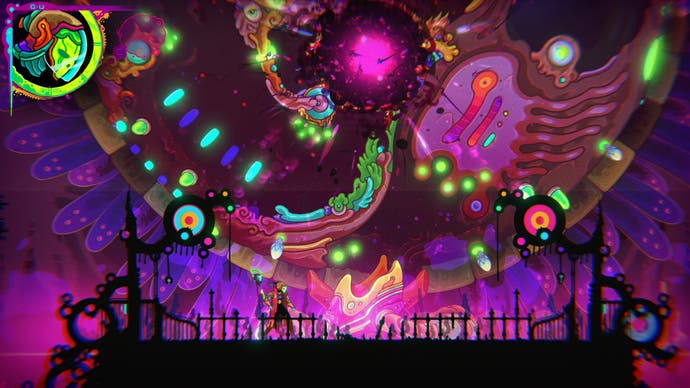Ultros review - a blossoming prog Metroidvania for the green-fingered
Scary monsteras.
Sorry to get all TikTok MBA on you, but if you're employing the rule of three in your marketing, you really want to make that third element count. It needs to sing. It needs to be explosive, or at least thoroughly radioactive. More than anything, it needs to upend any breezy certainties that elements one and two have lulled you into. It needs to be an agent of rapid recontextualisation.
Thank you for attending my TED Talk. And look at the giant screen behind me and you'll see Ultros, a Metroidvania that mints pure gold from the rule of three. What are we in for here? Action, exploration, and gardening. Wait. Gardening? What? Where am I?
The first two of these elements, in Ultros' case, are relatively easy to get your head around. It's the third that, for me, took a while to make its influence - and its fascinating impact - clear. So let's discuss all of these pieces in turn. But first, let's talk about the art, because, the rule of three aside, the art is the primal draw here.
Ultros casts you as a sort of prog space explorer who's crash landed on a giant cosmic uterus called the Sarcophagus. Trapped in the endless time loop of a black hole - we'll get to that in a bit - you must find your bearings, talk to anyone you find who wants to talk, fight with anyone or anything that is well past talking, and basically work out what's going on and what you need to do to fix everything.
As the words "cosmic uterus" may have suggested, this is not your typical Space Trucker fantasy. Ultros' 2D worlds are delivered in thick felt pen lines and following a raiding of the art supplies that focused only on the most lurid of colours. It's full of energy-drink greens and cocktail pinks. It loves oranges and purples, and most of all it loves layers. There's the black outline of the Sarcophagus itself, craggy and mine-like at one moment, erupting into art nouveau railings and Mucha stained-windows the next. On top of that, though, there's life spilling out, taking over, very much finding a way in all environments. A corridor may be a grotto because glowing mushrooms have worked their way between statues of praying figures. Elsewhere, giant space zits wait to rupture above carpets of swaying Lucozade corn. At first I thought I was walking through a King Crimson cover, but in truth there's something of 1980s indie comics at work here. The art team is lead by Niklas "El Huervo" Akerblad, best known perhaps for Hotline Miami. It makes exploration, just being in this world, intoxicating before you've even done anything here. (It works beautifully with the dreamy, doomy audio, too, by Oscar "Ratvader" Rydelius.)
That brings us to combat. While there are people to talk to and relationships to forge in Ultros, you'll spend a lot of the first parts of the game in particular killing horrible monsters. They come at you a jangle of limbs and feelers and plastic plating, and you strike with your blade to take down shields and attack weak spots. It's not about flailing, though. From the first enemy, who is heavily protected unless you dash beneath them and attack from behind, through to bosses who ripple between different forms and different shapes of invulnerability, you need to be precise: see an opening, dash in, strike, dash out to safety again.
You're always learning new approaches, and you're always encouraged to mix up your attacks, because when an enemy dies you get to harvest its internal organs, and only the most precise and creative attacks will give you that organ in a decent state. Once harvested, you can eat these things - or store them for a particularly disgusting rainy day - and then use the nutrition they providec to unlock new moves and new abilities on a sort of outward-reaching Cabbalistic skill tree. I know: this game is prog up the wazoo, but it's prog that wants you to have an extra beat to your combo, to get more information from the map, and to be able to stab people in the back for starters for massive damage.
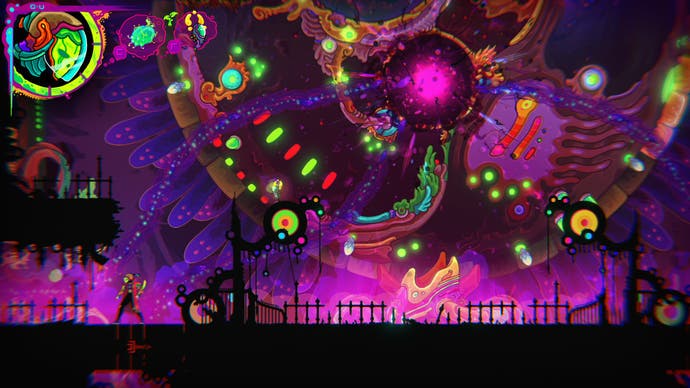
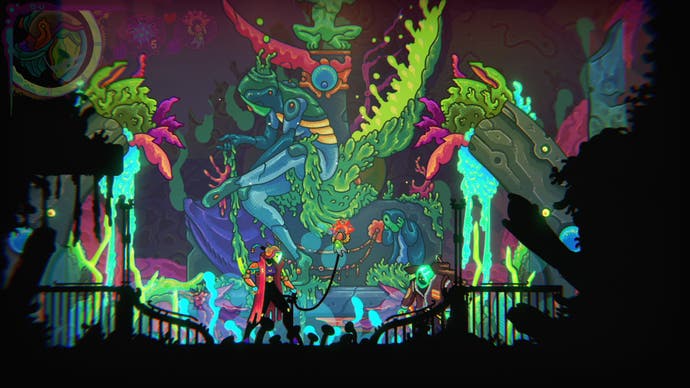
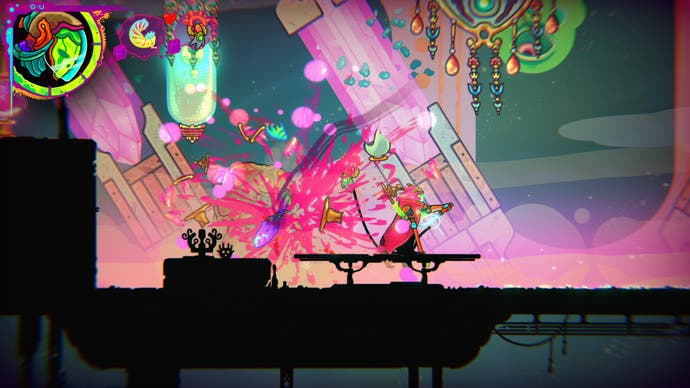
In between all this, Ultros is an excellent Metroidvania, with a map that unfolds in every direction, alternating between tunnels, corridors and space atriums and churches and spas where the ceiling rises high above you and you're generally left with two or three exits to ponder. You're always left with two or three possibilities, actually, a fact enhanced by the game's structure which sends you out to do a handful of things from the off, and then leaves you with a sense, at least, that you are somewhat in charge of the order in which you do them.
Gear-gating tends not to come down to the abilities you unlock on the skill tree, but has more to do with a sort of floating gadget you carry with you, whose name I neglected to write down. Now and then you earn extra powers for this thing, which often get you past different kinds of barriers. All very Metroidvania. But Metroidvania is not just a template: it's a particular strain of video game joy, and Ultros never forgets that. So one ability may allow you to hack through certain walls, while another might let you turn immersion in liquid into kinetic energy: tldr, you get an air boost, which is just a glorious bit of in-game freedom, coupled to some lovely ragdoll animation that sees your legs swinging back and forth as your rush towards the heavens.
All of this, but what about the gardening? What indeed, I thought early on, and for quite a while, as I enjoyed the Metroidvania stuff and the prog stylings, but struggled to see why I had met a gardener at the start, and why I was collecting seeds along with organs of my enemies, and why there was a time loop in play that reset things on occasions.
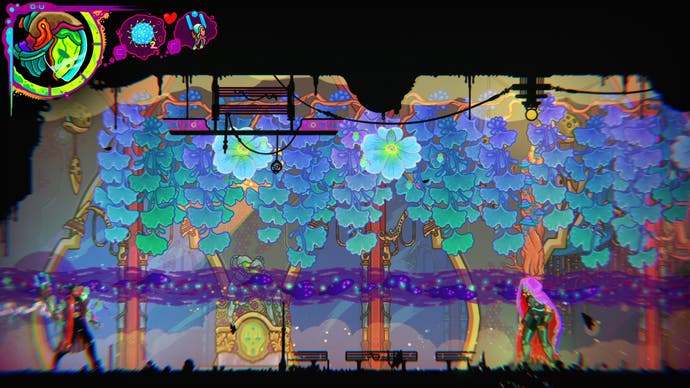
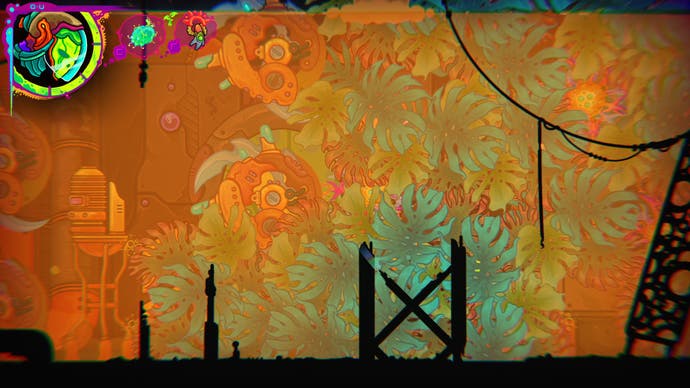
Okay, let's deal with this loop now, in fact. Every so often - it's actually somewhat under your control - the game's timeline loops and you go back to the start. The map you've uncovered is still uncovered, but you have to find your weapon again and that gadget that has all the different abilities. And your skill tree is reset.
This sounds annoying! But what should be clear by now is that Ultros is a game that has really thought about this stuff. So the skill tree is easier to unlock the second, third, eighth time around, and you also unlock the equivalent of pins to allow you to keep certain skills from being lost to the time loop. It takes a potentially annoying system, then, and makes it an entertaining series of tactical choices.
But why do it at all? This is because the world of Ultros wants you to understand that it's alive, alive with all this alien plant life that can't wait to grow and slither and fur up the walls with grasses, and send pods and fronds and all that horticultural jazz rippling through the air.

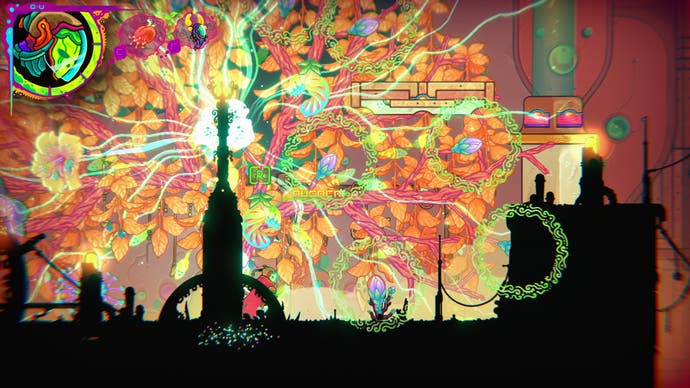
It took me a while to notice this, for sure. But on my third loop I realised that the world I was emerging back into was more verdant and weird than the world I had first discovered. And I was also learning about those seeds I was collecting, learning how one might create a sort of blood fountain that created a lip at the edge of rocks which I could use to jump further from, while another laid down grass that allowed me to really peg it along the ground and race up walls. The positions scattered around the map that I could plant these seeds in suddenly seemed tactical in themselves: maybe one creeper could bust through a door of clockwork that was stumping me. Maybe I could plant fungi platforms to allow me to climb higher.
But this stuff often takes time. It takes cycles and time loops. So while a big part of the game clicked into place once I had a tool to remove the seeds I had planted - and once I had a later tool that allowed me to...actually I shouldn't spoil it - a huge breakthrough was simply realising that maybe I planted today and then went and did something else, and the thing I had planted would only be really useful a few loops down the line.
What Ultros does with all this is genuinely brilliant. It takes a Metroidvania, with its overwhelming focus on making the player more powerful, and contorts it into something different mid-way through. Suddenly you're not evolving so much as helping to evolve the world around you. You're both changing, and you're both finding new opportunities that emerge as you change. It's genuinely a video game with one appendage in transformations and another in the sense of the passing - and repassing - of time. And another appendage in combat and another in weird art and brilliant prog noises, because sheesh does this game have a lot of appendages. It's an Ovid Metroidvania! A Metr-ovid-ania?
How to land this thing? Yesterday I was in a tank of unpromising liquid beset by saw-blades I couldn't get past. But I had a seed with me, which I knew would sprout a sort of space monstera, and like all monsteras, space or otherwise, this one would grow and grow and grow until its leaves clogged the saw blades and jammed the system and I could see where I was then. That's Ultros: a green-fingered Metroidvania that wants you to experiment. Experiment with nature, with the environment, and even, ultimately, with not killing everything you come across. I'm on board.
